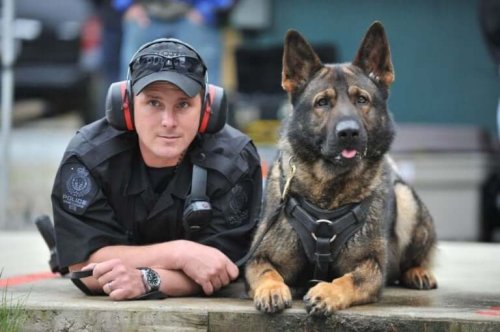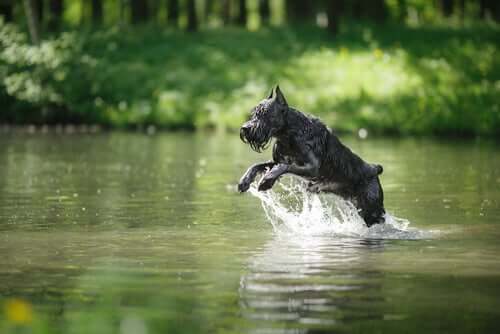K9 Dogs: The Nine Perfect Breeds for this Job

As opposed to their policemen counterparts, K9 dogs are most appreciated and respected by everyone. Their olfactory abilities are superb and, together with their many other abilities, they’re a big help for law enforcement officers. Today we’d like to tell you about some breeds who are perfect for the job. Ready to meet them?
But first, we’d like to say that, as with everything, some breeds are better suited for certain jobs than for others. For example, Labrador Retrievers are mainly used as guide dogs, while other kinds of dogs are great in therapy jobs.
Although we almost always associate the term “police dog” with German Shepherds, there are actually many other breeds who also do this job. Let’s find out which they are.
The best dog breeds for a K9 job

Before you meet the best breeds for a K9 job out there, let’s us tell you the four police dog categories in the force. You may not know it, but they fulfill different tasks. The categories are:
- Intervention dogs. These are used to find criminals, operations during riots, or as hostage rescuers in kidnapping cases.
- Detection dogs. You can find these in border protection departments. They search for smuggled drugs and explosives.
- Scientific police dogs. In this case, the dogs help find corpses, evidence and also participate in police lineups.
- Rescue dogs. These dogs mainly work when there’s damage caused by natural events like earthquakes, avalanches etc. They’re also quite useful for tracking.
Next, let’s see which breed is best suited for each job category.
Intervention K9 dogs
Belgian Shepherds are the best-suited dogs for this type of work. In fact, the Belgian Shepherd is one of the best dogs for this task due to their agility, intelligence as well as their impressive and striking physique.
German Shepherds are often chosen for police work. However, they’re no longer used, at least not as much as they were before. This is because they now have frequent health problems due to humans breeding them for “aesthetic” reasons. As a result, many have had to “retire” from the force.
Detection dogs
The Labrador Retriever is the best-suited dog for this kind of job because of their excellent olfactory abilities. Also, let’s not forget they’re well-known for their keen intelligence.
Also, the Beagle has an open and spontaneous character, and their nose stands far above others. Of course, there’s also the foxhound, a dog from the same family and with similar olfactory abilities.
Scientific K9 dogs
The bloodhound is one of the best-suited dogs for the police job, mainly because their sense of smell is truly spectacular. They can distinguish smells as old as two weeks.
The short-haired Dutch Shepherd has skills that set them apart from the rest of the dogs when it comes to doing police work. Long-haired Dutch Shepherds don’t have the same abilities.
Similarly, the Spanish Water Dog is capable of carrying out tasks such as detecting drugs and poisoned bait. They also work alongside forest law enforcers and port police, who select them based on their intelligence and uninhibited character.
Rescue dogs
German Shepherds are ideal for this job because of their intelligence and ability to learn. They’re brave, often fearless dogs and this is just what these cases require.
Belgian Shepherds are also great for this job because of their incredible strength and intelligence.

In addition, the giant Schnauzer is a rather active dog that seems to have an inexhaustible source of energy. This is a great quality to have when doing rescue work.
All dogs used in the police force receive excellent care. When they no longer have the strength to continue working, they retire and often join new families who are glad to adopt them.
Here in the US, all retired K9 dogs receive a life pension. It’s to make it easier on the families that take them in.
What else could we say to these brave creatures but, thank you for your service!
As opposed to their policemen counterparts, K9 dogs are most appreciated and respected by everyone. Their olfactory abilities are superb and, together with their many other abilities, they’re a big help for law enforcement officers. Today we’d like to tell you about some breeds who are perfect for the job. Ready to meet them?
But first, we’d like to say that, as with everything, some breeds are better suited for certain jobs than for others. For example, Labrador Retrievers are mainly used as guide dogs, while other kinds of dogs are great in therapy jobs.
Although we almost always associate the term “police dog” with German Shepherds, there are actually many other breeds who also do this job. Let’s find out which they are.
The best dog breeds for a K9 job

Before you meet the best breeds for a K9 job out there, let’s us tell you the four police dog categories in the force. You may not know it, but they fulfill different tasks. The categories are:
- Intervention dogs. These are used to find criminals, operations during riots, or as hostage rescuers in kidnapping cases.
- Detection dogs. You can find these in border protection departments. They search for smuggled drugs and explosives.
- Scientific police dogs. In this case, the dogs help find corpses, evidence and also participate in police lineups.
- Rescue dogs. These dogs mainly work when there’s damage caused by natural events like earthquakes, avalanches etc. They’re also quite useful for tracking.
Next, let’s see which breed is best suited for each job category.
Intervention K9 dogs
Belgian Shepherds are the best-suited dogs for this type of work. In fact, the Belgian Shepherd is one of the best dogs for this task due to their agility, intelligence as well as their impressive and striking physique.
German Shepherds are often chosen for police work. However, they’re no longer used, at least not as much as they were before. This is because they now have frequent health problems due to humans breeding them for “aesthetic” reasons. As a result, many have had to “retire” from the force.
Detection dogs
The Labrador Retriever is the best-suited dog for this kind of job because of their excellent olfactory abilities. Also, let’s not forget they’re well-known for their keen intelligence.
Also, the Beagle has an open and spontaneous character, and their nose stands far above others. Of course, there’s also the foxhound, a dog from the same family and with similar olfactory abilities.
Scientific K9 dogs
The bloodhound is one of the best-suited dogs for the police job, mainly because their sense of smell is truly spectacular. They can distinguish smells as old as two weeks.
The short-haired Dutch Shepherd has skills that set them apart from the rest of the dogs when it comes to doing police work. Long-haired Dutch Shepherds don’t have the same abilities.
Similarly, the Spanish Water Dog is capable of carrying out tasks such as detecting drugs and poisoned bait. They also work alongside forest law enforcers and port police, who select them based on their intelligence and uninhibited character.
Rescue dogs
German Shepherds are ideal for this job because of their intelligence and ability to learn. They’re brave, often fearless dogs and this is just what these cases require.
Belgian Shepherds are also great for this job because of their incredible strength and intelligence.

In addition, the giant Schnauzer is a rather active dog that seems to have an inexhaustible source of energy. This is a great quality to have when doing rescue work.
All dogs used in the police force receive excellent care. When they no longer have the strength to continue working, they retire and often join new families who are glad to adopt them.
Here in the US, all retired K9 dogs receive a life pension. It’s to make it easier on the families that take them in.
What else could we say to these brave creatures but, thank you for your service!
This text is provided for informational purposes only and does not replace consultation with a professional. If in doubt, consult your specialist.








